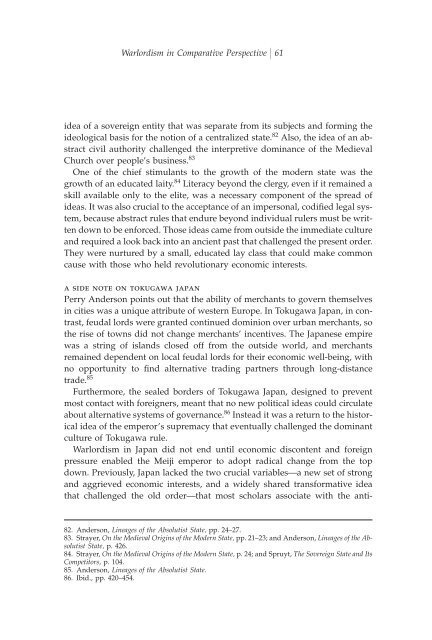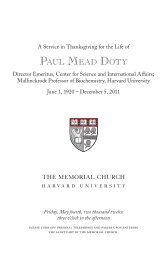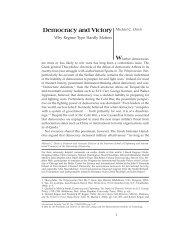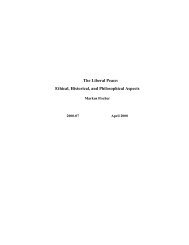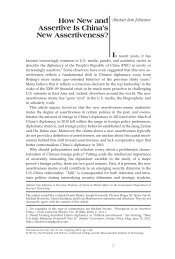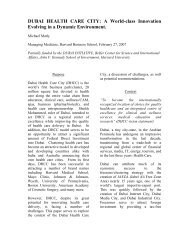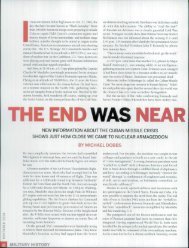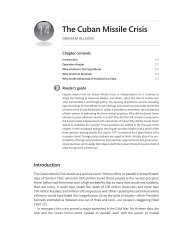Warlordism in Comparative Perspective - MIT Press Journals
Warlordism in Comparative Perspective - MIT Press Journals
Warlordism in Comparative Perspective - MIT Press Journals
Create successful ePaper yourself
Turn your PDF publications into a flip-book with our unique Google optimized e-Paper software.
<strong>Warlordism</strong> <strong>in</strong> <strong>Comparative</strong> <strong>Perspective</strong> 61<br />
idea of a sovereign entity that was separate from its subjects and form<strong>in</strong>g the<br />
ideological basis for the notion of a centralized state. 82 Also, the idea of an abstract<br />
civil authority challenged the <strong>in</strong>terpretive dom<strong>in</strong>ance of the Medieval<br />
Church over people’s bus<strong>in</strong>ess. 83<br />
One of the chief stimulants to the growth of the modern state was the<br />
growth of an educated laity. 84 Literacy beyond the clergy, even if it rema<strong>in</strong>ed a<br />
skill available only to the elite, was a necessary component of the spread of<br />
ideas. It was also crucial to the acceptance of an impersonal, codiªed legal system,<br />
because abstract rules that endure beyond <strong>in</strong>dividual rulers must be written<br />
down to be enforced. Those ideas came from outside the immediate culture<br />
and required a look back <strong>in</strong>to an ancient past that challenged the present order.<br />
They were nurtured by a small, educated lay class that could make common<br />
cause with those who held revolutionary economic <strong>in</strong>terests.<br />
a side note on tokugawa japan<br />
Perry Anderson po<strong>in</strong>ts out that the ability of merchants to govern themselves<br />
<strong>in</strong> cities was a unique attribute of western Europe. In Tokugawa Japan, <strong>in</strong> contrast,<br />
feudal lords were granted cont<strong>in</strong>ued dom<strong>in</strong>ion over urban merchants, so<br />
the rise of towns did not change merchants’ <strong>in</strong>centives. The Japanese empire<br />
was a str<strong>in</strong>g of islands closed off from the outside world, and merchants<br />
rema<strong>in</strong>ed dependent on local feudal lords for their economic well-be<strong>in</strong>g, with<br />
no opportunity to ªnd alternative trad<strong>in</strong>g partners through long-distance<br />
trade. 85<br />
Furthermore, the sealed borders of Tokugawa Japan, designed to prevent<br />
most contact with foreigners, meant that no new political ideas could circulate<br />
about alternative systems of governance. 86 Instead it was a return to the historical<br />
idea of the emperor’s supremacy that eventually challenged the dom<strong>in</strong>ant<br />
culture of Tokugawa rule.<br />
<strong>Warlordism</strong> <strong>in</strong> Japan did not end until economic discontent and foreign<br />
pressure enabled the Meiji emperor to adopt radical change from the top<br />
down. Previously, Japan lacked the two crucial variables—a new set of strong<br />
and aggrieved economic <strong>in</strong>terests, and a widely shared transformative idea<br />
that challenged the old order—that most scholars associate with the anti-<br />
82. Anderson, L<strong>in</strong>eages of the Absolutist State, pp. 24–27.<br />
83. Strayer, On the Medieval Orig<strong>in</strong>s of the Modern State, pp. 21–23; and Anderson, L<strong>in</strong>eages of the Absolutist<br />
State, p. 426.<br />
84. Strayer, On the Medieval Orig<strong>in</strong>s of the Modern State, p. 24; and Spruyt, The Sovereign State and Its<br />
Competitors, p. 104.<br />
85. Anderson, L<strong>in</strong>eages of the Absolutist State.<br />
86. Ibid., pp. 420–454.


